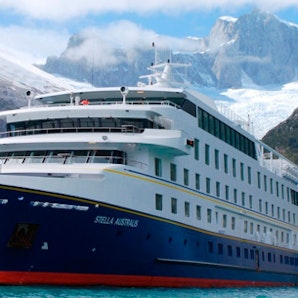Ventus Australis Cruise / Ushuaia - Punta Arenas
-
Duration: 5 days / 4 nights
-
Excursions: Shared
-
Departure: According coordinate departure (October to April)
-
Official language : Spanish / English
-
Start: Ushuaia
Description
Embark on this five-day, four-night expedition from Ushuaia (Argentina) to Punta Arenas (Chile). Discover the wild beauty of Patagonia on a voyage that will show you the region's pristine landscapes, varied wildlife and fascinating human history aboard an expedition ship that brings extraordinary levels of comfort and service to the end of the world.- Camera extension poles are prohibited on Magdalena Island
- Trekking shoes are a must for the passengers
Departure 2024 - 2025 M/N VENTUS AUSTRALIS (4 NOCHES)
- October 2024: 3 - 11 - 19 - 27
- November 2024: 4 - 12 - 20 - 28
- December 2024: 6 - 14 - 22 - 30
- January 2025: 7 - 15 - 23 - 31
- February 2025: 8 - 16 - 24
- March 2025: 4 - 12 - 20 - 28
Departures 2024 - 2025 M/N STELLA AUSTRALIS (4 NIGHTS)
- October 2024: 23 - 31
- November 2024: 8 - 16 - 24
- December 2024: 2 - 10 - 18 - 26
- January 2025: 3 - 11 - 19 - 27
- February 2025: 4 - 12 - 20 - 28
- March 2025: 8 - 16 - 24
Itinerary
Day 01: Ushuaia Check-In Between 10:00 PM and 5:00 PM, we will check-in at Avenida San Martín 409, next to the pier, to embark at 6:00 PM. After boarding, we will make a welcome toast and introduce the Captain and his crew. The ship will sail to the far south immediately after. Through the mythical Beagle Channel and the Strait of Magellan, we will travel through Patagonia and the channels of Tierra del Fuego.
Day 02: Cape Horn - Wulaia Bay We will sail through the Murray Channel and Nassau Bay, arriving at Cape Horn National Park, where we will disembark, if weather conditions permit, to experience the magic of walking through one of the southernmost points of the world, surrounded by charm and legends.
In the afternoon, we will disembark at Wulaia Bay, a historic site of one of the largest settlements of the native Yagans canoeists. We will reach a viewpoint, walking through the Magellanic forest in. which lengas, coigües, canelos, and ferns grow, among other species.
Day 03: Pía Glacier – Porter Glacier In the morning, we will sail along the northwest arm of the Beagle Channel to enter and disembark in the Pia Fjord. We will make a trip to the viewpoint from where you will see the homonymous glacier, whose main peak extends from the top of the mountain range to the sea. During the afternoon, in our Zodiac boats, we will navigate between high rocky walls until reaching the Porter Glacier.
Day 04: Agostini Sound – Águila Glacier – Cóndor Glacier In the morning, we will navigate the Cockburn Channel to enter the Agostini Sound, where you can appreciate the glaciers that descend from the center of the Darwin Mountain Range, some of them reaching the sea. During the morning, we will disembark in Zodiac boats for a walk around a lagoon formed by the melting of the Aguila Glacier. In the afternoon, we will navigate in Zodiac boats to approach the Condor Glacier. We will learn about the formation of glaciers and their influence on the abrupt geography of the Fuegian channels.
Day 05: Magdalena Island - Punta Arenas We will disembark at Magdalena Island first thing in the morning if weather conditions are suitable. On the island, we will be able to see a huge colony of Magellanic penguins. This excursion is replaced by a landing on Marta Island in September and April, where South American sea lions can be sighted from Zodiac boats.
Then, we will arrive in Punta Arenas, disembarking at approximately 12:30 hrs.
End of the services.
Accommodations
-
Cabin A
Ventus Australis Ushuaia - Punta Arenas or similar category, depending on availability.
-
Cabin AA
Ventus Australis Ushuaia - Punta Arenas or similar category, depending on availability.
-
Cabin AAA
Ventus Australis Ushuaia - Punta Arenas or similar category, depending on availability.
Important note: In the event that one of the hotels does not have availability, it will be exchanged for a hotel with similar characteristics.





















